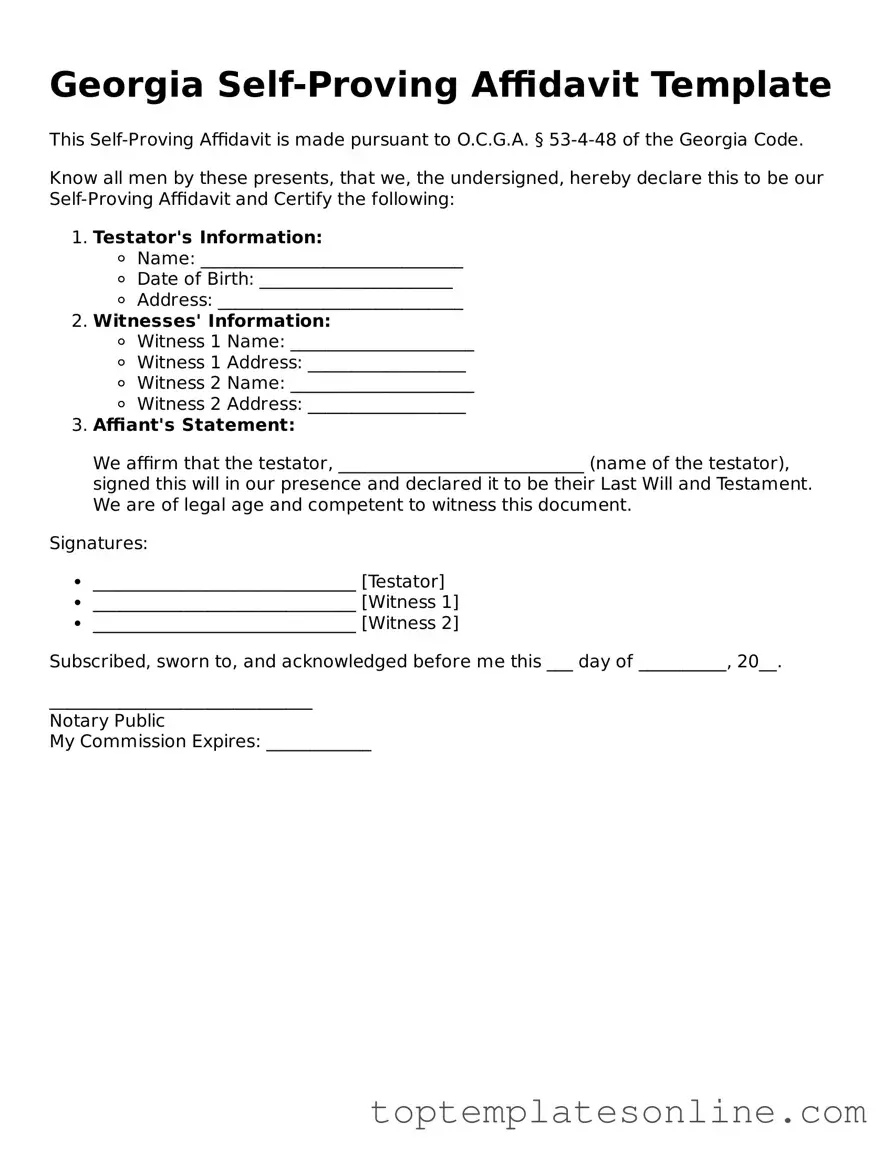Blank Self-Proving Affidavit Template for Georgia State
The Georgia Self-Proving Affidavit form plays a crucial role in the estate planning process, particularly in simplifying the probate of wills. This legal document allows a testator, or will-maker, to affirm that their will was executed in accordance with state laws, thus reducing the need for witnesses to testify in court after the testator's death. By utilizing this form, individuals can expedite the probate process and minimize potential disputes among heirs. The affidavit must be signed by the testator in the presence of a notary public, who also signs and seals the document, adding an extra layer of authenticity. This form not only enhances the validity of the will but also provides peace of mind to the testator, knowing that their wishes will be honored without unnecessary complications. Understanding the components and requirements of the Georgia Self-Proving Affidavit is essential for anyone looking to ensure their estate is handled according to their desires, making it an important tool in effective estate planning.
Some Other State-specific Self-Proving Affidavit Templates
Self Proved Will Texas - The affidavit promotes understanding and agreement among beneficiaries.
A Florida Non-disclosure Agreement (NDA) is a legally binding contract designed to protect sensitive information shared between parties. By signing this agreement, individuals or businesses commit to keeping confidential information private, ensuring that proprietary details remain secure. For those interested, you can find more resources related to this agreement at Florida Forms. Understanding the nuances of this form is essential for anyone looking to safeguard their intellectual property or trade secrets in the state of Florida.
Ny Will Requirements - By adopting a Self-Proving Affidavit, estate plans can remain efficient and effective, even after death.
Common mistakes
-
Incorrect Signatures: All required parties must sign the affidavit. This includes the testator and the witnesses. If any signature is missing, the affidavit may be considered invalid.
-
Failure to Notarize: The affidavit must be notarized to be legally binding. Without a notary's signature and seal, the document lacks legal weight.
-
Inaccurate Information: Providing incorrect personal details, such as names or addresses, can lead to complications. Ensure all information is accurate and matches official documents.
-
Improper Formatting: The affidavit must follow the specific format required by Georgia law. Deviating from this format can result in rejection by the court.
-
Not Understanding the Purpose: Some individuals may not fully understand what a self-proving affidavit is or its implications. This lack of understanding can lead to mistakes in its completion.
Guide to Writing Georgia Self-Proving Affidavit
After completing the Georgia Self-Proving Affidavit form, it is important to ensure that all necessary signatures and information are correctly provided. This step will help validate the will in accordance with Georgia law.
- Begin by obtaining the Georgia Self-Proving Affidavit form. This can be found online or through legal stationery stores.
- At the top of the form, enter the name of the deceased individual as it appears on the will.
- Fill in the date the will was executed. This is typically the date when the deceased signed the will.
- Provide the names and addresses of the witnesses who observed the signing of the will. Make sure to include all required witness information.
- Each witness must sign the form in the designated area, affirming that they witnessed the testator's signature.
- Next, the testator (the person who created the will) must also sign the affidavit. This signature should be placed in the specified section.
- If applicable, include a notary public's signature and seal to validate the affidavit. This step is crucial for the affidavit's acceptance in court.
- Review the completed form for accuracy. Ensure all names, dates, and signatures are correct.
- Make copies of the signed affidavit for personal records and for any parties who may need it.
Documents used along the form
When creating a will in Georgia, the Self-Proving Affidavit is a valuable document that helps simplify the probate process. However, it is often used in conjunction with other important forms and documents. Understanding these additional documents can provide clarity and ensure that your estate planning is comprehensive and effective.
- Last Will and Testament: This is the primary document that outlines how a person's assets will be distributed after their death. It specifies beneficiaries and may include instructions for guardianship of minor children.
- Durable Power of Attorney: This document grants someone the authority to make financial and legal decisions on behalf of another person if they become incapacitated. It is crucial for managing affairs when one cannot do so themselves.
- Healthcare Power of Attorney: Similar to the Durable Power of Attorney, this form designates an individual to make medical decisions on behalf of another person if they are unable to communicate their wishes.
- Living Will: This document outlines a person's preferences regarding medical treatment in situations where they are unable to express their wishes, particularly concerning end-of-life care.
- Revocation of Will: If someone wishes to invalidate a previous will, this document serves to formally revoke it. This is important to ensure that only the most current wishes are honored.
- Residential Lease Agreement: For those renting properties in Florida, the floridaforms.net/blank-residential-lease-agreement-form is essential in establishing clear terms between landlords and tenants, ensuring that both parties understand their rights and responsibilities.
- Affidavit of Execution: This document may be used to affirm that the will was executed in accordance with legal requirements. It can help verify the authenticity of the will during probate.
- Codicil: A codicil is an amendment to an existing will. It allows individuals to make changes without creating an entirely new will, streamlining the process of updating their estate plan.
Incorporating these documents into your estate planning can help ensure that your wishes are respected and that your loved ones are taken care of. Each form plays a unique role in the overall process, and understanding them is essential for effective planning.
